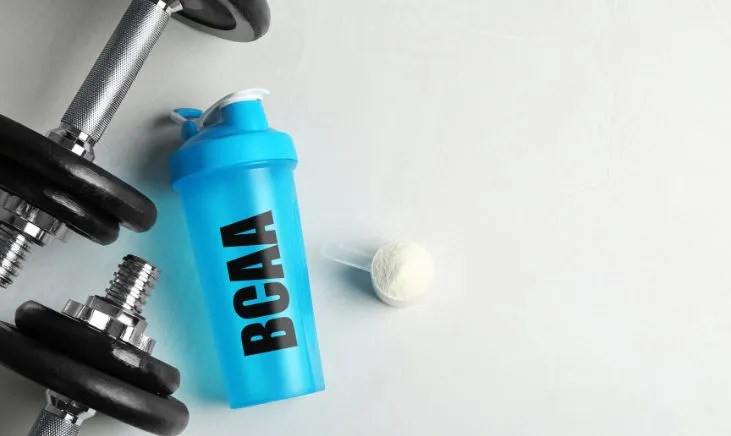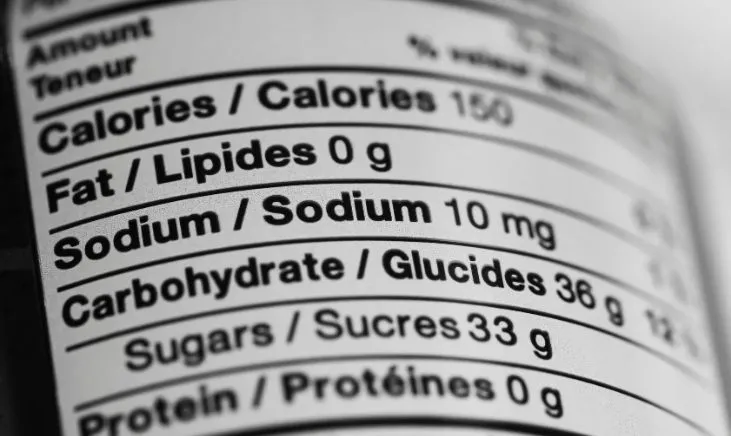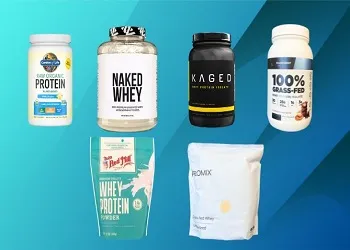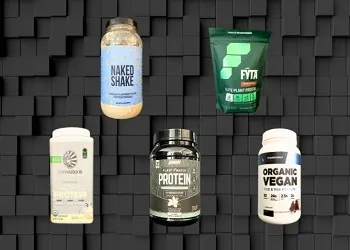Branched-chain amino acids (BCAAs) are three essential amino acids (EAAs) that support muscle growth, enhance muscle repair, and reduce intra-workout fatigue. BCAAs can be taken in doses of up to 12 grams daily with minimal side effects and can be taken pre-, intra-, or post-workout for optimal results.
Quick Look
- Branched-chain amino acids are three EAAs—leucine, isoleucine, and valine—with significant athletic benefits.
- BCAA supplements can increase muscle mass, boost muscle repair, and minimize intra-workout muscle fatigue.
- BCAA doses of up to 12 grams daily are well-tolerated with minimal side effects.
- Ensure your BCAA supplement is third-party tested and certified for quality and cleanliness.
Table of Contents
What Are Branched Chain Amino Acids?

To understand what the BCAAs are, it’s important to understand the basics of amino acids.
Ready for a quick chemistry lesson?
Amino acids are the building blocks of all proteins and serve as nitrogenous backbones for various compounds, such as neurotransmitters and hormones. In technical terms, amino acids are organic compounds that contain two groups:
- Amino (-NH2) group
- Carboxylic acid (-COOH) group
Hence the name, amino acid. Proteins are long chains of amino acids linked by an amide bond, also known as a peptide linkage. The difference in the R-group (the side chain) determines the properties of the amino acid. However, each protein’s uniqueness is determined by the combination of amino acids it contains.
While there are hundreds of amino acids, there are only 20 needed to make up the proteins found in the human body. Let’s break down those numbers—20,000 unique protein-encoding genes create more than 100,000 unique proteins in the body. These 20 amino acids are categorized into three groups:
- Essential amino acids: Cannot be produced in the body and must come from external sources (food or supplements).
- Non-essential amino acids: Can be synthesized in the body by combining EAAs.
- Conditionally essential amino acids: Cannot be synthesized in sufficient quantities during certain physiological periods of growth, such as pregnancy, adolescent development, or recovery from trauma.
There Are Nine Essential Amino Acids

The table below summarizes the 20 amino acids and their category.
| Essential | Non-essential | Conditionally essential |
| Phenylalanine | Alanine | Arginine |
| Valine | Aspartic acid (aspartate) | Cysteine |
| Tryptophan | Asparagine | Glutamine |
| Threonine | Glutamic acid (glutamate) | Glycine |
| Isoleucine | Selenocysteine | Proline |
| Methionine | Serine | |
| Histidine | Tyrosine | |
| Leucine | ||
| Lysine |
** Bolded amino acids are BCAAs.
Within the EAA category, we have a sub-category: the branched-chain amino acids, also known as BCAAs. Three amino acids—leucine, isoleucine, and valine—are named for their branching side chains.
BCAAs have powerful anabolic properties that promote muscle growth, making them one of the most popular supplements in the fitness industry.
Because muscle protein is constantly turning over, protein synthesis occurs continuously to replace protein lost due to protein breakdown. For new muscle protein synthesis to occur, all nine EAAs and all eleven non-essential amino acids must be present. While all three BCAAs are involved in stimulating muscle growth and repair, leucine plays the most significant role, serving as a precursor for muscle protein synthesis (MPS) and regulating intracellular signaling pathways involved in protein synthesis processes.
So, what’s the difference between EAAs and BCAAs?
All BCAAs are an essential amino acid, but not all EAAs acids are BCAAs.
BCAAs are known for their role in muscle protein synthesis and athletic performance, but consuming only BCAAs doesn’t offer the full spectrum of amino acids needed to synthesize functional proteins.
Key takeaway: Branched-chain amino acids are three essential amino acids involved in muscle protein synthesis. They include leucine, isoleucine, and valine.
What Is BCAA Powder?
When buying a branched-chain amino acid supplement, there are two options:
- Capsules
- Powder
BCAA powder is the more popular option, with supplements available in various flavors ranging from wild blue raspberry to sour peach rings and tropical punch.
In the best-case scenario, a BCAA powder will only contain branched-chain amino acids, but most available products will also contain additives like flavoring and coloring. Some BCAA powders will also include other nutritional supplements, such as caffeine or electrolytes.
If you’re looking for the cleanest BCAA supplement, capsules are generally your best bet.
Top 3 Benefits of BCAA Supplements
BCAA powder supplements are one of the top choices for athletes looking to maximize muscle growth, but the benefits of amino acids don’t end there. Here are three benefits of BCAAs that make them a great option to add to your stack.
- Support Muscle Growth

Whether you want to maintain or gain lean muscle mass, adding BCAAs to your stack is a great place to start. The three BCAAs—leucine, isoleucine, and valine—have potent roles in muscle growth by activating key enzymes involved in muscle growth pathways. In doing so, they support muscle growth and maintenance in two ways:
- Increase muscle protein synthesis
- Reduce muscle protein breakdown
Leucine has the biggest role of the three by targeting the rapamycin complex-1 (mTOR), a key signaling protein that triggers the muscle-building cascade. In addition to turning on muscle growth, BCAAs can mitigate muscle fatigue, helping you train harder for longer and achieve more muscle growth.
- Decrease Muscle Soreness
Muscle growth is typically the result of intense training and serious consistency, sometimes resulting in muscle soreness. If achy muscles prevent you from training, BCAAs might help. Studies show that BCAA supplementation can help reduce the effects of muscle damage by improving muscle recovery post-workout. How? They have been shown to reduce muscle protein breakdown and lower specific markers of muscle damage, such as creatine kinase.
BCAAs have proved to be especially helpful for reducing DOMS (delayed onset muscle soreness), usually occurring 24 and 72 hours after exercise.
- Reduce Intra-Workout Fatigue
If you struggle to get through your entire workout without your muscles cramping or feeling overly gassed, sipping on BCAAs during your workout might enhance your work capacity and reduce muscle fatigue. Research shows that branched-chain amino acids don’t necessarily reduce feelings of fatigue, but they can help reduce fatigue substances, energy metabolites, and muscle soreness substances.
Specifically, BCAA intake attenuates the production of serotonin by reducing the uptake of free tryptophan in the brain and reducing brain 5-HT (serotonin) synthesis, thereby delaying central fatigue.
Key takeaway: BCAA supplements may improve exercise performance by supporting lean muscle mass, reducing muscle breakdown, enhancing muscle recovery, and decreasing intra-workout fatigue.
When to Take BCAAs

If you want to improve your athletic performance but aren’t sure when to use BCAAs for optimal effects, we have the details.
Unlike something like pre-workout, when you take your BCAAs isn’t as important as how much you’re taking. Choosing the correct dose and being consistent with BCAA consumption can offer more benefits than taking it before, during, or after a lift. If you take your BCAA supplement before a workout, the effects typically peak 30 minutes after ingestion.
With BCAAs, you have three options for timing:
- Pre-workout: If you’re looking for a little workout boost, taking a BCAA supplement might offer more sustained energy, but little evidence suggests it’s necessary before training. Some research suggests it could reduce muscle soreness when taken before a workout.
- Intra-workout: Most people choose to take BCAAs during their workout. This is because the BCAAs compete with tryptophan for entry into the brain. Because tryptophan is converted into serotonin, drinking BCAAs during training could reduce exercise fatigue by limiting tryptophan uptake.
- Post-workout: Thanks to their role in muscle recovery, taking BCAAs post-workout may help facilitate greater muscle repair and reduce the onset of DOMS. Although it’s been said that the “anabolic window of opportunity” is about 45-60 minutes after a workout, more recent evidence suggests this window could be much longer, giving you a longer period to consume amino acids. And if you’ve consumed a protein-rich meal pre-workout, the need for BCAAs immediately post-workout is much lower.
Key takeaway: When you take your BCAA supplement might vary based on your desired outcome, but to achieve maximum benefits, be consistent with the dosage and daily consumption.
How Much BCAAs Should I Take?

If you’ve decided a BCAA supplement is right for you, you’re probably wondering how much you need to take for maximum benefit. There are no specific daily recommended doses of BCAAs, but here are some guidelines.
BCAA Dosage for Women
Women participating in regular resistance training should aim to consume 3-5 grams of BCAAs a day. You may need to increase your dosage if you’re involved in rigorous training. Research suggests that up to 12 grams daily is safe for consumption, but you’ll want to divide your dosages.
BCAA Dosage for Men
The recommended BCAA dosage for men is up to 20 grams a day, broken into smaller doses. If you’re not participating in strenuous exercise, you can opt for the lower end of the dose recommendations, divided into two doses. If you’re training multiple times a day or are involved in high-intensity training, you can increase your dose.
Remember: The BCAAs are also available in animal-based food sources, so your supplemental dose may be lower if you consume protein-rich foods around workout times.
BCAA Risks and Side Effects
BCAA supplements are considered safe for healthy adults, but that doesn’t mean they’re free from risks and side effects.
Experts suggest that when taken orally, BCAAs are safe in doses of up to 12 grams daily for up to two years.
However, some individuals may experience mild side effects, including:
- Fatigue
- Loss of coordination
- Mild stomach upset
- Nausea
- Diarrhea
- Bloating
What to Look for in BCAA Supplements

If you opt for a BCAA supplement, it’s important to note that not all supplements are created equal. Thanks to modern manufacturing, most BCAA supplements are loaded with additives, artificial flavors, artificial sweeteners, and food dyes—these are all things you’ll want to avoid.
So, what should you look for?
- Ingredients
Whether you’re looking for BCAAs, pre-workout, or creatine supplements, the ingredient list should always be the first thing you look at. Not only do you want to ensure you’re actually getting the compound you need, but you want to ensure you’re not getting a bunch of other stuff you don’t need.
Always choose quality and cleanliness over everything else.
In a BCAA supplement, first check that it has branched-chain amino acids—the first ingredients on the label should be leucine, isoleucine, and valine. If you’re getting pure BCAAs, they should be the only ingredients on the label, whether in capsules or a BCAA powder. If you have a BCAA drink, you’ll likely see other ingredients (flavors, colors, etc.). Ideally, stay away from artificial flavors, sweeteners, and food dyes whenever possible, as they’ve been linked to things like cardiovascular disease, cancer, genotoxicity, and more.
- Amino Acid Ratio
You’ll want to look at the amino acid ratio before buying a BCAA supplement. Because leucine has the greatest effect on athletic performance, you’ll want a product that contains at least a 2:1:1 ratio of leucine, isoleucine, and valine.
- Certifications
The FDA doesn’t heavily regulate the nutritional supplements industry, so you’ll want to ensure the BCAA supplementation you’re buying is third-party tested for quality.
Third-party organizations like Informed Choice offer quality assurance that your supplement has been tested for prohibited substances and that the product was produced in an environment with quality systems appropriate for supplement manufacturing.
You can also look for the following certifications on BCAA powders:
- Good Manufacturing Practices (GMP)
- NSF
- USDA Certified Organic
- U.S. Pharmacopeia (USP)
- Certified Vegan
If your supplement contains any of the above certifications, rest assured that it has been quality tested and contains ingredients safe for human consumption.
Conclusion
BCAA powders are one of the most popular fitness supplements that significantly benefit muscle mass retention and growth, recovery, and intra-workout fatigue. But if you’re buying a BCAA powder supplement, ensure you’re looking for a 2:1:1 ratio of leucine, isoleucine, and valine and that the product is third-party tested and certified safe.
Frequently Asked Questions
Do I need BCAAs if I take whey protein?
BCAA supplements aren’t 100% necessary if you consume enough high-quality dietary protein daily. Adequate protein intake is essential for people participating in moderate to vigorous physical activity to support muscle growth and recovery. Adding a BCAA supplement may offer additional benefits for muscle soreness and intra-workout fatigue that dietary protein doesn’t.
Can I take whey protein and amino acids together?
Yes! It is safe to take whey protein and branched-chain amino acids together. Many people take BCAAs and whey protein as part of their fitness protocol to support muscle growth and repair. Whey protein is a complete source of protein that offers all of the essential amino acids, so BCAAs are found in whey protein. However, a BCAA supplement will offer higher leucine, isoleucine, and valine ratios.
When should you take BCAAs?
BCAAs can be taken pre-, intra-, or post-workout. Taking BCAAs before a workout may offer benefits for attenuating DOMS and exercise-induced muscle damage (EIMD) caused by eccentric exercise. Taking BCAAs post-workout may support muscle growth and repair to help reduce soreness.
Should I take BCAA supplements every day?
Research has shown that BCAA supplements can safely be taken for up to two years in doses of up to 12 grams. Studies have shown that extended supplementation of over ten days is ideal for the beneficial effects. Some research shows that taking BCAA powder days to weeks before strenuous exercise may help to mitigate skeletal muscle tissue alterations by enhancing mitochondrial biogenesis and free radical scavenging capacities.
Do BCAAs help with fat loss?
BCAAs aren’t necessarily a weight loss supplement, but some research suggests that BCAAs can improve fat metabolism and muscle synthesis. One study found that weightlifters taking 14 grams of BCAAs daily lost 1% more body fat over eight weeks than those taking 28 grams of whey protein daily. The lifters taking BCAAs also gained 4.4 pounds more muscle than the other group.














